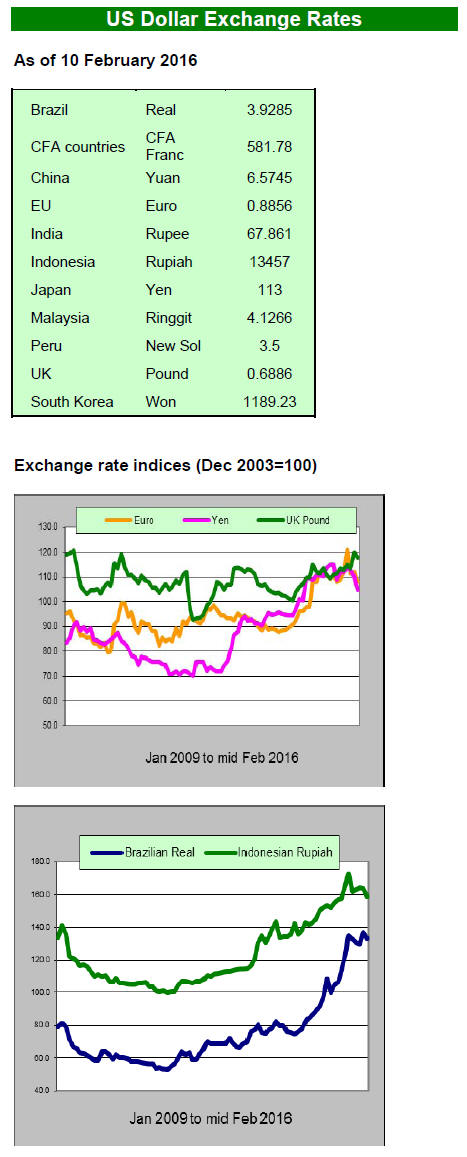2. GHANA
AGI says business confidence continues to
fall
The inflation rate in Ghana rose to a record 19% in
January this year, up from 17.7% in December last year.
This was made known by the Deputy Government
Statistician, Mr. Baah Wiredu, who attributed the increase
mainly to a rise in non-food inflation components such as
water, electricity and transport. Late last year utility prices
were increased by more than 50%.
In a related development the Association of Ghana
Industries (AGI), which has members from timber
processing companies, said in a press release that its
business confidence index dropped from 97.3 in the third
quarter 2015 to 93.1 in the final quarter of the year. AGI
attributed the drop to major challenges that industries
faced including the high costs of electricity, inadequate
power supply and currency instability.
First FSC teak from Ghana
This year Form Ghana reached a milestone in plantation
forestry with the first harvest of 3,000 cubic metres of teak
from FSC certified plantations near Akumadan, the capital
of Offinso North.
The teak plantations are managed by Form Ghana and
have been certified since 2010. The plantations have been
established and are managed with the help of Form
International in the Netherlands.
The vision of Form Ghana is that reforestation of degraded
forest land should be conducted to the highest standards
for sustainable forest management, serving the needs of
the local communities and restoring vital environmental
services within an economically viable business model.
A recent press release from the company says it plans to
reforest around at least 20,000 hectares of degraded forest
reserve in Ghana, so far 7,000 hectares has been planted.
Finnish delegation discusses investments
Ghana¡¯s forest resource may soon receive a boost
following a meeting between the Minister for Lands and
Natural Resources and a business delegation from Finland.
Minister Nii Osa Mills emphasised the country¡¯s forest
potential with the visiting delegation.
The Minister said, though the country has lost much of its
forest cover due to illegal mining activities, slash-and-burn
agriculture and over-cutting for fuelwood efforts are being
made on reforestation. Ghana had over 8.2 million
hectares of forest cover, but this is currently estimated to
be only 4.6 million hectares.
February prices
Prices for wood products remained unchanged as of 30
January.
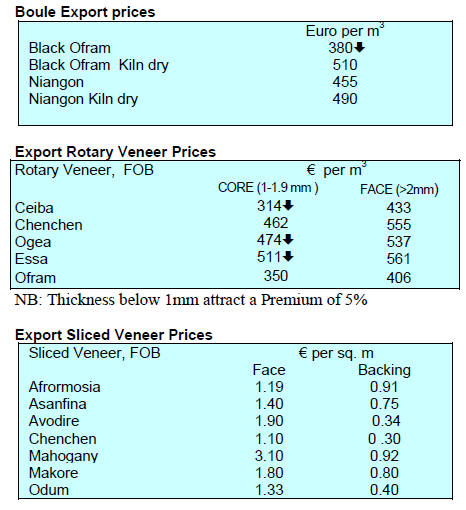
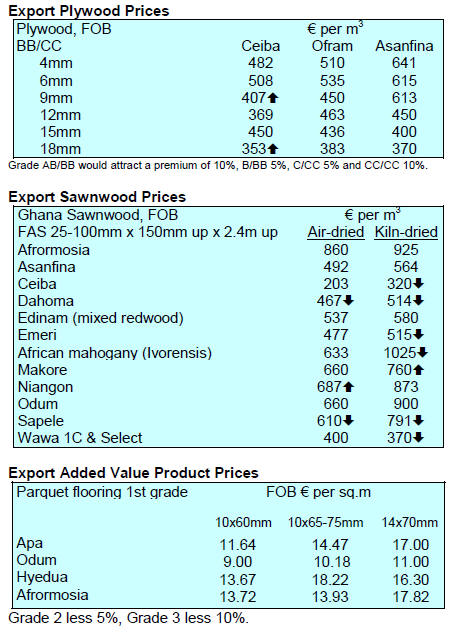
3. MALAYSIA
Drop in oil revenues forces cuts to
government
spending
Logging operations, mills and factories ceased operations
for the annual holidays as Malaysia celebrated Chinese
New Year on 8 February, not in a very cheerful mood
however as the collapse in oil prices is rocking Malaysia¡¯s
economy. The country is the 26th ranked global oil
producers at around 700,000 barrels a day and oil revenue
is important for the economy.
In the face of falling revenues the government has been
forced to adjust the federal budget. In the revised 2016
budget revenues are expected to drop between 3-4%
which has forced a cut in spending which will have a
knock-on effect on GDP.
Companies secure government promise to review
foreign worker levy rate hike
Malaysia depends on foreign workers to sustain output in
the construction, plantation and manufacturing industries
and there are over 2 million registered foreign workers in
the country. Estimates put the number of illegal workers at
another 2 million.
The government has increased the levies on companies to
try and reduce their dependence on foreign workers. Most
hit will be the plantation and agriculture sectors.
Companies are complaining about the sudden steep
rise in
the levies and 55 business groups representing large and
small enterprises have urged the Government to give up on
its 300% rise in levies on foreign workers saying the
magnitude of the increase was too high.
In a press release the Sarawak Timber Association said
the timber industry ¡°is highly dependent on the export
markets, this sudden increase in the cost of doing business
would certainly lead to an increase in the prices of
Malaysian timber products and thus render them less
competitive compared to similar products from our
competitors such as Indonesia and Vietnam¡±.
The government has announced it will re-view the
proposed levy rates.
Orangutan habit protection brings results
Efforts by the Sabah State Administration to protect its
wildlife especially the iconic orangutan seems to be
successful as the number of orphaned animals arriving at
the state run rehabilitation centre in Sipilok has dropped
sharply.
Dr. Sen Nathan, the Centre¡¯s Director, said only two
orangutan were brought to the centre in 2015 whereas 10
years ago the annual number was around 20.
The decline is put down to enforced protection of the
animal¡¯s habitat such as in the Ulu Segama-Malua forest
reserve, Dermakot as well as the Lower Kinabatangan
wildlife sanctuary. Sen said that the Kabili forest reserve
adjacent to the rehabilitation centre is home to dozens of
saved orangutan which are now breeding.
Choose plantation species wisely says Chieg Minister
Sarawak Chief Minister, Adenan Satem, has called on
holders of Licenses for Planted Forests (LPF) to be
committed to establishing high quality plantations. In the
past the emphasis was on the area planted but this led to
the planting of species of low commercial value.
Adenan spoke on the need to select the correct species
suited to the site and of a type that will yield timber for a
wide range of products.
Nigeria and Ghana gateway to West African trade
growth
MATRADE¡¯s Commissioner to West Africa, Saifuddin
Khalid, said economic growth in West African countries is
offering an opportunity for Malaysian exporters and that
MATRADE will use English speaking Ghana and Nigeria
as the base for business development in ECOWAS
(Economic Community of West African States).
ECOWAS is a 15-member regional group with a mandate
to promote economic integration in all fields of activity of
the constituting countries. Member countries making up
ECOWAS are Benin, Burkina Faso, Cape Verde, Cote
d¡¯Ivoire, The Gambia, Ghana, Guinea, Guinea Bissau,
Liberia, Mali, Niger, Nigeria, Sierra Leone, Senegal and
Togo.
Saifuddin noted that Malaysia enjoyed good relationship
with countries in West Africa before the region was hit by
political uncertainties in the 1990s, which led to Malaysian
companies divesting their investments.
For more see:
: http://www.nst.com.my/news/2016/02/126307/matrade-expandmalaysian-
products-west-africa
4. INDONESIA
EU says annul exclusions to allow FLEGT
licensing
scheme to go ahead
The EU has alerted Indonesia to the risk that the country
would miss the opportunity to become the first in the
world to achieve recognition of FLEGT licensed exports if
the Ministry of Trade continues to allow the export of
many wood products without the national SVLK license.
An extensive list of products were initially included in the
VPA/FLEGT negotiations between Indonesia and the EU
but the Ministry of Trade has removed the requirement for
SVLK certification from several items produced by small
and medium sized companies arguing they could neither
afford nor have the capacity to cope with the requirements
of the SVLK.
Indonesia had agreed to reinstate the SVLK to products
earlier agreed by the end of 2015 but this deadline was not
achieved.
Agus Sarsito, Indonesia¡¯s chief negotiator for the VPA and
for the items included in the FLEGT scheme said the EU
is ready to fully implement the VPA when Indonesia
annuls the changes made to the product list.
Asmindo, the Indonesian Furniture Entrepreneurs
Association says it recognises the benefits of SVLK
certification since this will lead to FLEGT licensing and
easy access to EU markets but wants furniture SMEs to be
offered an easy and low cost way to comply.
AEC to bring tough competition to domestic furniture
market
Domestic furniture producers see that they could lose their
share of the domestic furniture market to ASEAN and
other county exporters if the cannot become more
competitive.
The launch of the ASEAN Economic Community (AEC)
jolted Asmindo to begin gearing up for strong competition
in the domestic market.
Asmindo will host the four-day Indonesia International
Furniture and Craft Fair (IFFINA) in March targeting both
local and global buyers and is aiming for contracts worth
over US$400 million.
Cut in rubber exports could lead to fall in log
availability
Indonesia, Malaysia and Thailand are the main exporters
of natural rubber but as prices have plummeted the three
have agreed to cut production and exports.
The three countries are strongly represented in the
International Tripartite Rubber Council (ITRC) and will
begin reducing exports by 615,000 tons in the six months
to the end of August.
This cut could have a major impact on the availability of
rubberwood logs harvested as plantations are replaced. If
the pace of plantation replacement drops lower volumes of
rubberwood logs will be available to millers and could
send prices rising.
Chinese delegation examines SVLK
Putera Parthama of the Ministry of Environment and
Forestry recently hosted a visit by a delegation from China
led by Dr. Chen Shao Zhi, Director General of the
Research Institute of Forestry Policy and Information,
Chinese Academy of Forestry.
The Chinese government has an interest in Indonesia¡¯s
timber legality assurance system (SVLK) and Indonesia
proudly explained the working of the SVLK to the
Chinese delegation.
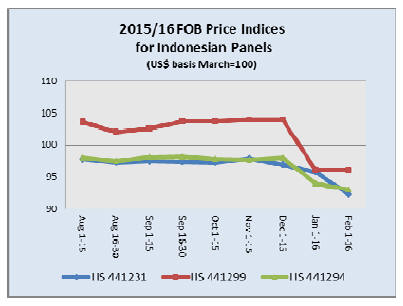
¡¡
5. MYANMAR
Myanmar forestry and timber sectors to
benefit from
transparency
The Extractive Industries Transparency Initiative (EITI)
has announced that Myanmar has been accepted as a
¡®Candidate¡¯ country to the EITI, the global
transparency standard. Myanmar now joins 44 countries
that have signed up to the EITI Standard which requires
extensive information disclosure and measures to
improve accountability in how natural resources are
governed.
It is understood that Myanmar¡¯s timber sector will be
included in the list of EITI and as such all statistics related
to the sector will be provided to an independent auditor.
In an on-line statement Clare Short, Chair of the EITI,
said: ¡°Myanmar¡¯s admission to the EITI comes at a critical
time as the country is now opening up its vast natural
resources for foreign investment.
By implementing the EITI, the government has made a
commitment to the people of Myanmar: that they will have
the right see how these resources are managed. I
encourage the government to make use of the EITI as a
tool to inspire wider reforms and to enshrine transparency
in government institutions.¡±
For more see:
https://eiti.org/news/myanmar-admitted-eiticandidate
VPA and Myanmar/China MOU explained
On 1 February the Director General of Forest Department
called a meeting of senior officials of MOECAF to explain
the VPA negotiation. At the meeting the Deputy DG
revealed the ultimate goal is a logging Ban. However, he
did not clarify when such a ban would be introduced.
Analysts point out that the election manifesto of the new
government addressed timber extraction and indicated it
will be reduced but a logging ban was not mentioned. The
timber industry plays a vital role in providing for domestic
demand and in generating export earnings and a ban on all
harvesting would have far reaching consequences.
Analysts point out that even now there many redundant
working elephants and owners are facing a tough time
supporting them.
The Deputy DG also provided details of the
Myanmar/China MoU which he said has three objectives -
to eliminate the illegal timber trade, to prevent forest fires
along the border and to establish wood processing
industries.
In another development, MOECAF has terminated
cooperation with EcoDev, an outspoken environmental
NGO. EcoDev played an important role in providing a
means for civil society organisations to participate in the
VPA preparation phase.
Sales in the local market
The Local Marketing and Milling Department of the
Myanma Timber Enterprise recently sold teak logs (mixed
Quality SG7 and lower) and hardwood logs to local mills.
Average price (Kyats) were as follows, teak logs (reject
quality) 1,003,841, pyinkado logs 381,194, hnaw logs
317,849, thinwin logs 252,912 and kanyin logs 340,000.
6.
INDIA
Business conditions now easier for the
construction
sector
Considerable progress has been reported towards
enhancing the ease of doing business the construction
sector especially in urban areas. This, says a press release
from Credai, stems from streamlining procedures,
adoption of appropriate technology and by empowering
urban local bodies to provide a wide range of approvals.
Progress on reforms were recently reviewed at a high level
meeting convened by the Minister of Urban Development
and Housing and Urban Poverty Alleviation Shri
M.Venkaiah-Naidu.
Defence Minister, Shri Manohar Parrikar, Civil Aviation
Minister, Shri Ashok Gajapati Raju, Minister of
Environment, Forests and Climate Change, Shri Prakash
Javdekar and the Minister of Tourism and Culture,
Dr.Mahesh Sharma participated in the review meeting.
The Ministry of Environment, Forests and Climate Change
has revised and simplified environmental standards that
must be met. These will be made available after
consultations with the Ministry of Urban Development.
For more see: http://www.credai.org/significant-progressmade-
towards-improving-ease-doing-constructionbusiness-
urban-areas-pib
Private consortium to lead affordable housing drive
The International Finance Corporation (IFC) is leading a
collaborative effort with major Indian housing sector
companies to form an industry-led Sustainable Housing
Leadership Consortium the focus of which will be on the
affordable housing sector. The effort is part of IFC's Ecocities
programme supported by the European Union.
The Economic Times of India reports that Mahindra
Lifespace Developers Limited, Shapoorji Pallonji Real
Estate, Tata Housing Development Company, and VBHC
Value Homes Private Limited will participate.
Johann Hesse, Head of Cooperation of the European
Union in India said "Buildings contribute to about 30-40
percent of energy consumption in many Indian cities and
about 22 percent of the country's annual greenhouse gas
emissions.
The founding members of the consortium have committed
to make 100 percent of their housing portfolio sustainable
by 2017 through appropriate green-building certifications.
For more see:
http://economictimes.indiatimes.com/articleshow/50838711.cms
?utm_source=contentofinterest&utm_medium=text&utm_campa
ign=cppst
Plywood industry sourcing alternatives to gurjan
Indian consumers are accustomed to red colored face and
back veneers, mostly imported gurjan, for the panel
products. Plywood manufacturers depended on imports of
gurjan from Myanmar since domestic sources of suitable
Dipterocarpus timbers were insufficient to meet the
requirements of the plywood sector.
Now that Myanmar has banned log exports Indian
manufacturers are facing a problem in securing peeler logs
of a colour to satisfy consumer preferences.
There are two ways to overcome this problem; encourage
consumers to accept domestic and imported timbers of
another colour with properties similar to gurjan or identify
alternative large sized, red coloured timbers suitable for
peeling.
Trials have been conducted with okoume and sapelli and a
measure of market acceptance has been reported. In
addition some timbers from Malaysia, Papua and New
Guinea and Solomon Islands have been found acceptable.
The timbers being assessed include amoora antiaris,
calophyllum, campnosperma, erima, grey canarium, hoop
pine, klinki pine, labula litsea, lophopetalum, mersawa,
pink satinwood, red cedar, planchonella, silkwood, maple,
silver ash and sloanea.
Currently alternatives to gurjan account for around 40% of
the timbers used for peeling.
Prices for locally sawn hardwoods
Some price changes have been observed due to the
depreciation of Rupee.
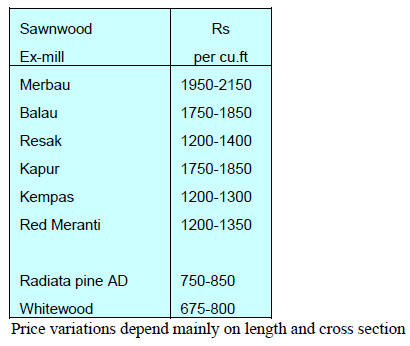
Prices for imported plantation teak, C&F Indian
ports
Analysts report several price changes reflecting variation
in the size of the logs shipped.
Mexico has joined the ranks of plantation teak shippers to
India.
Recent weakness in the rupee exchange rate has raised the
landed cost and manufacturers are attempting to pass on
price increases.

Myanmar teak flitches resawn in India
There has been no change in pricing over the past two
weeks. Imports of large sized flitches from Myanmar are
helping sustain teak stocks.
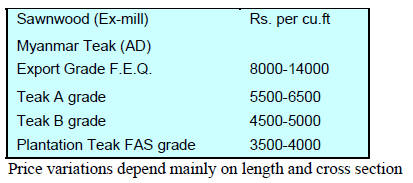
Prices for imported sawnwood
The depreciation of rupee has resulted in changes in
domestic prices.
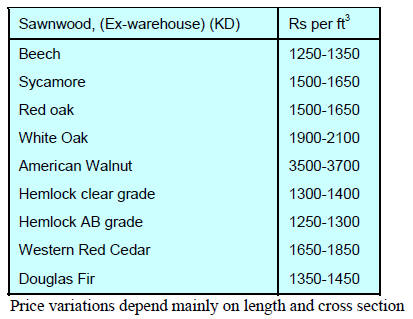
Plywood market trends
The cost of imported plywood is rising as the rupee
weakens but prices for locally manufactured plywood
remained unchanged.
As reported earlier gurjan a face and back veneer is being
replaced such that at present gurjan accounts for only 40%
of total veneer production.
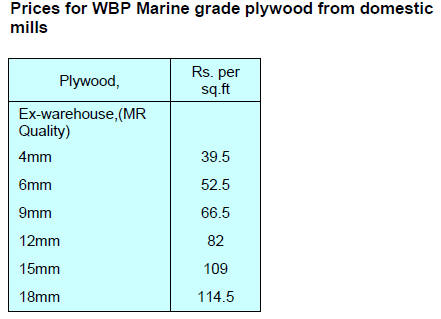
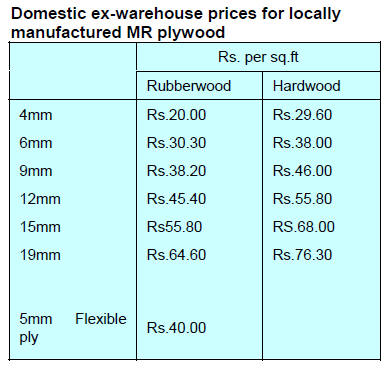
7.
BRAZIL
¡®Orchestra Brazil¡¯ a success story
Companies participating in ¡®Orchestra Brazil¡¯ increased
exports by 9% in 2015 compared to 2014.
The ¡®Orchestra Brazil¡¯ project supports the furniture sector
and has grown out of cooperation between the Bento
Gonçalves Furniture Industry Union (Sindm¨®veis) and the
Brazilian Trade and Investment Promotion Agency (Apex-
Brazil).
One factor explaining the growth was the number of
markets targeted through the project and the rise in the
number of companies participating in the project.
The markets which contributed most to the positive
performance in 2015 were the United States, the main
destination at 13.7% and Bolivia for which exports more
than doubled making Bolivia the second most important
market within the Orchestra Brazil Project. Other
significant markets were Mexico (9% growth), Uruguay
(11% growth), Canada (120% growth), Guatemala (4.2%),
Turkey (72.6%), Spain (277.8%) and Belgium (63.6%).
The Orchestra Brazil Project has functioned since 2006
and promotes competitive furniture suppliers in
international markets. Market studies, prospecting
missions as well as participation in major trade fairs have
been conducted. Currently, 62 companies are associated
with the Project and for 2016 the priority markets are
South Africa, Argentina, Bolivia, Chile, Colombia, the
United States, Mexico, Peru, Turkey and Vietnam.
Rio Grande do Sul Furniture exports down in 2015
2015 was not good for furniture exporters in Rio Grande
do Sul State, as exports dropped over 15% according to
the Ministry of Development, Industry and Foreign Trade
(MDIC). In 2015 the furniture industry earned US$183.5
million from exports compared with the US$216 million
in 2014.
The main export destinations were the UK, Peru and
Paraguay. The US market was ranked fourth and
accounted for just over 10% of total state furniture
exports.
Rio Grande do Sul lost the leadership in the ranking of
furniture exporters in the country. Manufacturers in the
state closed 2015 in second place accounting for 30.5% of
foreign sales compared to the 34.3% achieved by
manufacturers in the state of Santa Catarina. Other top
states in terms of furniture exports were the State of
Paran¨¢ (13.7%) and the State of São Paulo (11.5%).
Weak international demand coupled with the tough
economic conditions in the country and the impact of these
on production has been cited as the reason for the decline
in export furniture output.
The furniture industry in Brazil faces many uncertainties
and challenges in the year ahead. To offer competitive
products analysts point out that there is a need for the
sector players to invest in product differentiation, added
value production technology and design innovations..
Inspection nets illegal timber
Agents of the Jaru Biological Reserve, with support from
the Amazon Region Protected Areas Program (ARPA), the
Brazilian Institute for Environment and Renewable
Natural Resources (IBAMA) and the Rondônia Military
Police, conducted operations in the eastern part of the
Amazon Reserve spanning Rondônia and Mato Grosso.
The operation resulted in the seizure of almost 1,000 cubic
metres of illegally logged timber.
The aim of this operation was to monitor the
implementation of management plans in the area and to
clamp down on any offenses such as illegal logging,
deforestation, illegal mining and hunting.
The inspection team decided the seized timber had to be
destroyed because it was too expensive to transport the
timber to the nearest mill (240km) because of the poor
condition of the road due to heavy rains.
Usually the seized timber is auctioned but in this case
IBAMA chose to destroy the timber to prevent it being
recovered if left on-site.
Digital aid for forest management
The Brazilian Agricultural Research Corporation
(EMBRAPA) will conduct a training course on the Digital
Modelling of Logging (MODEFLORA) for professionals
of the Institute of Management and Forest Certification
(IMAFLORA), the agency responsible for forest
certification in Piracicaba, São Paulo.
The MODEFLORA model was developed by EMBRAPA
in 2008 and it has been tested on 32,000 ha of forest areas
designated for logging. One of the main advantages of the
technology is accuracy of information generated in forest
management activities.
The technology uses the Global Positioning System
(GPS), the Geographic Information System (GIS) and
Remote Sensing (RS) for the location of trees and provides
for micro-zoning of the area. This is of great help for
forest management planning.
The information contributes to activity planning and
accurate execution of fieldwork.
Another advantage is that working with accurate digital
data reduces the incidence of inventory errors and cuts the
cost of conducting mapping. EMBRAPA says cos saving
can be as much as 30%.
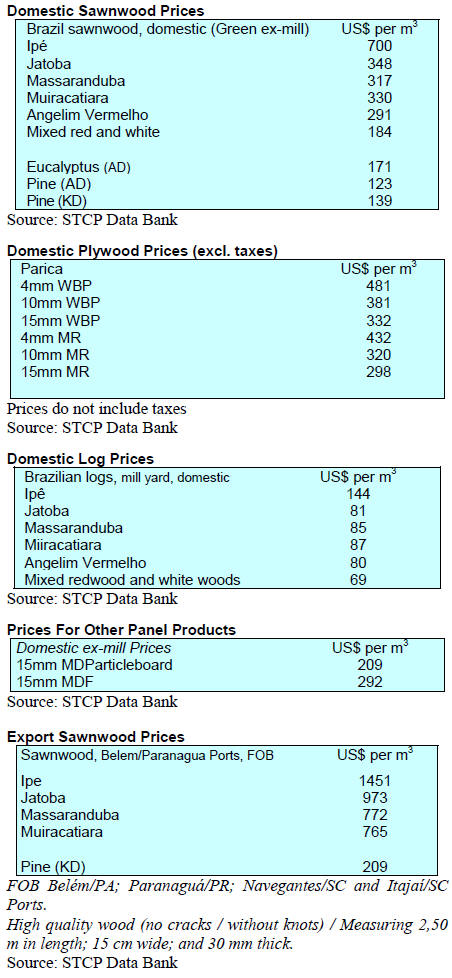
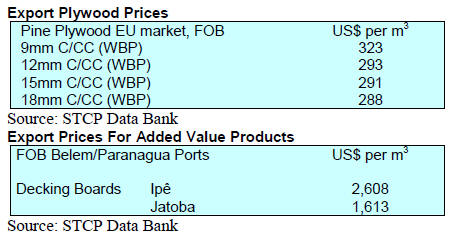
¡¡
8. PERU
ADEX arranges furniture technology
mission to Brazil
In support of domestic furniture manufacturers the
Association of Exporters (ADEX) is arranging to guide a
group of company representatives to visit machinery
manufacturers, suppliers of finishes and designers in
Brazil.
From 30 April to 7 May this year the group will visit
suppliers in the city of Beto Goncalves in Southern Brazil.
The aim is to lay the foundation for cooperation for
training and technology exchange.
FENAFOR 2016 Lima
Registrations are now open for the biannual furniture fair
FENAFOR which will run from 27 to 29 October 2016 in
Lima. The organisers are optimistic that the years¡¯ fair will
be the biggest yet. According to the statement from the
organizers there will be business delegations from Italy,
Germany, Taiwan P.o.C, Turkey, Brazil and Argentina
amongst others.
During the fair there will be business conferences,
presenations by specialists, consultants and forest
entrepreneurs.
Productivity and competitiveness to be raised
The World Bank Board has approved two projects to
promote productivity in Peru. This comes at a time when
international demand is weakening so it becomes more
important for the country to raise productivity and
improve competitiveness.
The Bank initiative will focus on private sector training
and competitiveness as well as on strengthen n publicprivate
communication and partnerships.
The Bank project can draw on over US$1 billion from its
fund for Boosting Human Capital and Productivity
Development Policy Financing which seeks to support the
Government of Peru in its efforts to strengthen the quality
of public education and improve the business environment
for enterprises. Project resources can also be used to
implement simplified customs procedures that facilitate
exports and access to international markets.
For more see: http://www.worldbank.org/en/news/pressrelease/
2016/02/11/world-bank-supports-peru-to-promoteproductivity-
and-strengthen-fiscal-management
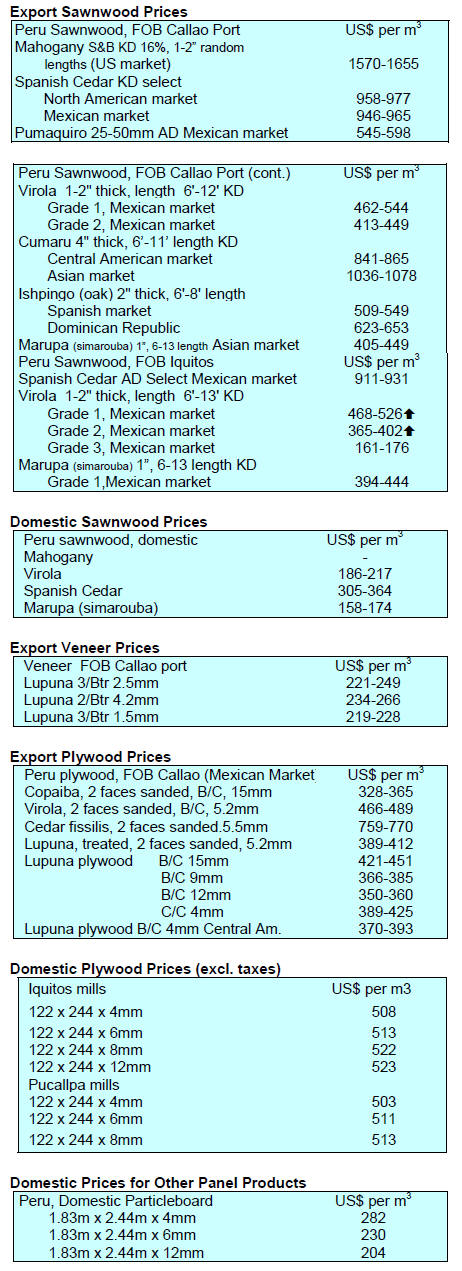
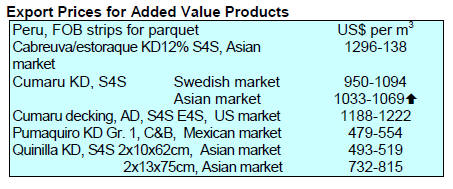 YANA
YANA
